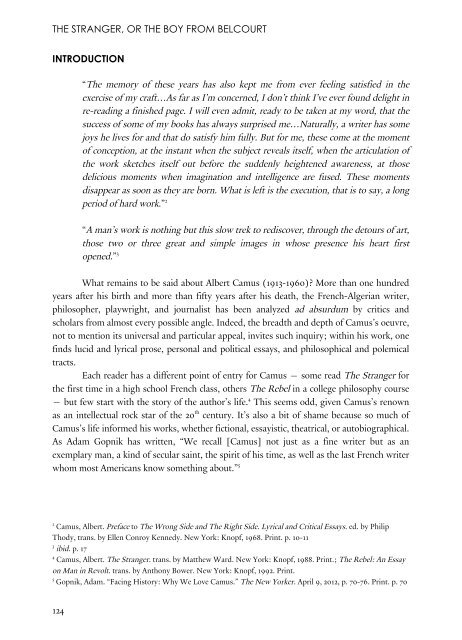The Stranger Or the Boy from Belcourt
The Stranger Or the Boy from Belcourt
The Stranger Or the Boy from Belcourt
- No tags were found...
Create successful ePaper yourself
Turn your PDF publications into a flip-book with our unique Google optimized e-Paper software.
THE STRANGER, OR THE BOY FROM BELCOURTINTRODUCTION“<strong>The</strong> memory of <strong>the</strong>se years has also kept me <strong>from</strong> ever feeling satisfied in <strong>the</strong>exercise of my craft…As far as I’m concerned, I don’t think I’ve ever found delight inre-reading a finished page. I will even admit, ready to be taken at my word, that <strong>the</strong>success of some of my books has always surprised me…Naturally, a writer has somejoys he lives for and that do satisfy him fully. But for me, <strong>the</strong>se come at <strong>the</strong> momentof conception, at <strong>the</strong> instant when <strong>the</strong> subject reveals itself, when <strong>the</strong> articulation of<strong>the</strong> work sketches itself out before <strong>the</strong> suddenly heightened awareness, at thosedelicious moments when imagination and intelligence are fused. <strong>The</strong>se momentsdisappear as soon as <strong>the</strong>y are born. What is left is <strong>the</strong> execution, that is to say, a longperiod of hard work.” 2“A man’s work is nothing but this slow trek to rediscover, through <strong>the</strong> detours of art,those two or three great and simple images in whose presence his heart firstopened.” 3What remains to be said about Albert Camus (1913-1960)? More than one hundredyears after his birth and more than fifty years after his death, <strong>the</strong> French-Algerian writer,philosopher, playwright, and journalist has been analyzed ad absurdum by critics andscholars <strong>from</strong> almost every possible angle. Indeed, <strong>the</strong> breadth and depth of Camus’s oeuvre,not to mention its universal and particular appeal, invites such inquiry; within his work, onefinds lucid and lyrical prose, personal and political essays, and philosophical and polemicaltracts.Each reader has a different point of entry for Camus — some read <strong>The</strong> <strong>Stranger</strong> for<strong>the</strong> first time in a high school French class, o<strong>the</strong>rs <strong>The</strong> Rebel in a college philosophy course— but few start with <strong>the</strong> story of <strong>the</strong> author’s life. 4 This seems odd, given Camus’s renownas an intellectual rock star of <strong>the</strong> 20 th century. It’s also a bit of shame because so much ofCamus’s life informed his works, whe<strong>the</strong>r fictional, essayistic, <strong>the</strong>atrical, or autobiographical.As Adam Gopnik has written, “We recall [Camus] not just as a fine writer but as anexemplary man, a kind of secular saint, <strong>the</strong> spirit of his time, as well as <strong>the</strong> last French writerwhom most Americans know something about.” 52 Camus, Albert. Preface to <strong>The</strong> Wrong Side and <strong>The</strong> Right Side. Lyrical and Critical Essays. ed. by PhilipThody, trans. by Ellen Conroy Kennedy. New York: Knopf, 1968. Print. p. 10-113ibid. p. 174 Camus, Albert. <strong>The</strong> <strong>Stranger</strong>. trans. by Mat<strong>the</strong>w Ward. New York: Knopf, 1988. Print.; <strong>The</strong> Rebel: An Essayon Man in Revolt. trans. by Anthony Bower. New York: Knopf, 1992. Print.5 Gopnik, Adam. “Facing History: Why We Love Camus.” <strong>The</strong> New Yorker. April 9, 2012, p. 70-76. Print. p. 70124


